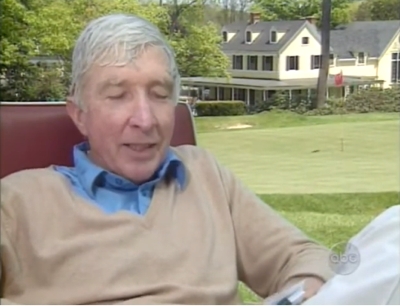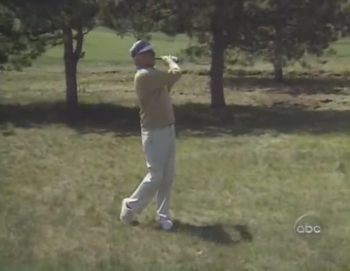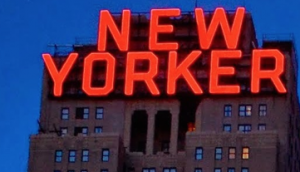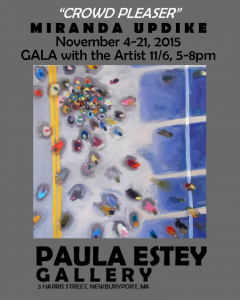1951 : Born in Étampes (91)
1968 : Baccalaureate A (Lycée de Pontoise, Val d’Oise)
1968-69 : American Field Service Scholarship (Rock Island, Illinois)
1969-72 : Higher Literature and Première supérieure (Lycée Fénelon, Paris)
1972-76 : École normale supérieure de jeunes filles (ENS-Sèvres)
1973-74 : Lecturer at Oxford (Lady Margaret Hall and St Anne’s)
1975 : Agrégation in English and CAPES in Modern Literature
1975-76, 1977-78 : Visiting Lecturer in French, Yale University
1980 : 3rd cycle thesis : “The everyday and the sacred in the fiction of John Updike” (under the direction of Jacques Cabau, Paris III)
1978-81 : Assistant-Professor in French, Wellesley College
1981-98 : Assistant Professor, then Lecturer, University of Provence
1997 : HDR (under the direction of Claude Fleurdorge, Montpellier III)
1998-2017 : Professor of American Literature, Aix-Marseille University
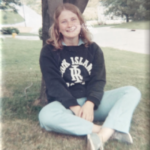 Mathé talks about the full trajectory of her career, including the experience of spending her senior year in high school in Rock Island, Ill. “Compared to my final year in French, the amount of work was nothing like it was, nor the demands of the homework,” she told the interviewer. She shared that her host family was “extremely puritanical,” with the mother “surprised, even horrified, that I had read texts by Hemingway, or Sanctuary by Faulkner…It must be said that 1968 in a small town in Illinois was still the 50s. It had nothing to do with what was happening on campuses at the same time, with women’s lib, demonstrations against the Vietnam War, for civil rights, etc.” In summary, “Let’s say that compared to my final year in French, or my life in France, which was essentially focused on high school, work and success, it was a much more varied life, more entertaining…I was doing things I had never done before: I was caught up in the rhythm, I went to matches according to the football, basketball, baseball seasons,” and she dated, went to parties where there was drinking and marijuana brownies, and was generally inducted into American culture.
Mathé talks about the full trajectory of her career, including the experience of spending her senior year in high school in Rock Island, Ill. “Compared to my final year in French, the amount of work was nothing like it was, nor the demands of the homework,” she told the interviewer. She shared that her host family was “extremely puritanical,” with the mother “surprised, even horrified, that I had read texts by Hemingway, or Sanctuary by Faulkner…It must be said that 1968 in a small town in Illinois was still the 50s. It had nothing to do with what was happening on campuses at the same time, with women’s lib, demonstrations against the Vietnam War, for civil rights, etc.” In summary, “Let’s say that compared to my final year in French, or my life in France, which was essentially focused on high school, work and success, it was a much more varied life, more entertaining…I was doing things I had never done before: I was caught up in the rhythm, I went to matches according to the football, basketball, baseball seasons,” and she dated, went to parties where there was drinking and marijuana brownies, and was generally inducted into American culture.
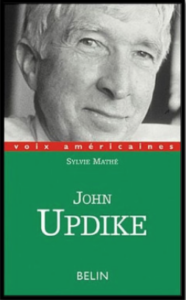 Mathé’s introduction to John Updike came when she went to Oxford and studied “Puritanism in John Updike’s Fiction” with Jeanne-Marie Santraud, “who was the only Americanist at Paris IV.” She would go on to write her master’s thesis on Updike and compose a monograph for the American Voices series edited by Marc Chénetier titled John Updike: Nostalgia for America.
Mathé’s introduction to John Updike came when she went to Oxford and studied “Puritanism in John Updike’s Fiction” with Jeanne-Marie Santraud, “who was the only Americanist at Paris IV.” She would go on to write her master’s thesis on Updike and compose a monograph for the American Voices series edited by Marc Chénetier titled John Updike: Nostalgia for America.
Updike “knew French,” Mathé says. “He came to France for a few months with his family. In several of his novels, for example in Couples, we find a character who prides himself on speaking French. Generally, it’s very funny because he misses the mark.”
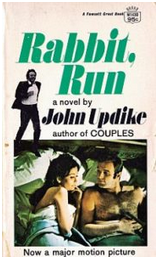 In an opinion piece for The Times (UK), Benjamin Markovits writes that he doesn’t remember reading John Updike’s Rabbit, Run when it first came out in 1960, partly because he was “suspicious” of the book’s popularity and was hesitant about such things as the “breathless present tense” of the narrative or the opening scene that has Rabbit knocking down a jump shot without even taking off his double-breasted jacket. “But then, just recently, I reread it and was stunned again by how good it is. The basic story hasn’t grown old either.”
In an opinion piece for The Times (UK), Benjamin Markovits writes that he doesn’t remember reading John Updike’s Rabbit, Run when it first came out in 1960, partly because he was “suspicious” of the book’s popularity and was hesitant about such things as the “breathless present tense” of the narrative or the opening scene that has Rabbit knocking down a jump shot without even taking off his double-breasted jacket. “But then, just recently, I reread it and was stunned again by how good it is. The basic story hasn’t grown old either.”
 The Philip Roth and John Updike societies announced that registration is now open to participate in a joint conference to be held in New York City, Oct. 19-22, 2025.
The Philip Roth and John Updike societies announced that registration is now open to participate in a joint conference to be held in New York City, Oct. 19-22, 2025. Displays will include founding documents, rare manuscripts, photos, cover and cartoon art, and artifacts on loan from other institutions–all intended to take visitors “behind the scenes of the making of one of the United States’s most important magazines,” according to City Life Org.
Displays will include founding documents, rare manuscripts, photos, cover and cartoon art, and artifacts on loan from other institutions–all intended to take visitors “behind the scenes of the making of one of the United States’s most important magazines,” according to City Life Org. “In the small town of Eastwick, Rhode Island, three women — Alexandra, Jane, and Sukie — discover they have magical powers after their marriages end.
“In the small town of Eastwick, Rhode Island, three women — Alexandra, Jane, and Sukie — discover they have magical powers after their marriages end.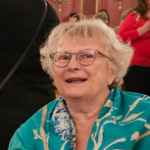 John Updike Society board member Sylvie Mathé was profiled in the series “Persistence of Character — Major interview: Archaeology of a journey” in e-Rea, electronic journal of studies on the English-speaking world. The series, published in French, tracks the breadth of an entire career of distinguished intellectuals, including early influences. An English translation exists in PDF form, but in a file to big to upload and no link to share. Here is the link to a French version online:
John Updike Society board member Sylvie Mathé was profiled in the series “Persistence of Character — Major interview: Archaeology of a journey” in e-Rea, electronic journal of studies on the English-speaking world. The series, published in French, tracks the breadth of an entire career of distinguished intellectuals, including early influences. An English translation exists in PDF form, but in a file to big to upload and no link to share. Here is the link to a French version online:  Mathé talks about the full trajectory of her career, including the experience of spending her senior year in high school in Rock Island, Ill. “Compared to my final year in French, the amount of work was nothing like it was, nor the demands of the homework,” she told the interviewer. She shared that her host family was “extremely puritanical,” with the mother “surprised, even horrified, that I had read texts by Hemingway, or Sanctuary by Faulkner…It must be said that 1968 in a small town in Illinois was still the 50s. It had nothing to do with what was happening on campuses at the same time, with women’s lib, demonstrations against the Vietnam War, for civil rights, etc.” In summary, “Let’s say that compared to my final year in French, or my life in France, which was essentially focused on high school, work and success, it was a much more varied life, more entertaining…I was doing things I had never done before: I was caught up in the rhythm, I went to matches according to the football, basketball, baseball seasons,” and she dated, went to parties where there was drinking and marijuana brownies, and was generally inducted into American culture.
Mathé talks about the full trajectory of her career, including the experience of spending her senior year in high school in Rock Island, Ill. “Compared to my final year in French, the amount of work was nothing like it was, nor the demands of the homework,” she told the interviewer. She shared that her host family was “extremely puritanical,” with the mother “surprised, even horrified, that I had read texts by Hemingway, or Sanctuary by Faulkner…It must be said that 1968 in a small town in Illinois was still the 50s. It had nothing to do with what was happening on campuses at the same time, with women’s lib, demonstrations against the Vietnam War, for civil rights, etc.” In summary, “Let’s say that compared to my final year in French, or my life in France, which was essentially focused on high school, work and success, it was a much more varied life, more entertaining…I was doing things I had never done before: I was caught up in the rhythm, I went to matches according to the football, basketball, baseball seasons,” and she dated, went to parties where there was drinking and marijuana brownies, and was generally inducted into American culture. Mathé’s introduction to John Updike came when she went to Oxford and studied “Puritanism in John Updike’s Fiction” with Jeanne-Marie Santraud, “who was the only Americanist at Paris IV.” She would go on to write her master’s thesis on Updike and compose a monograph for the American Voices series edited by Marc Chénetier titled John Updike: Nostalgia for America.
Mathé’s introduction to John Updike came when she went to Oxford and studied “Puritanism in John Updike’s Fiction” with Jeanne-Marie Santraud, “who was the only Americanist at Paris IV.” She would go on to write her master’s thesis on Updike and compose a monograph for the American Voices series edited by Marc Chénetier titled John Updike: Nostalgia for America.